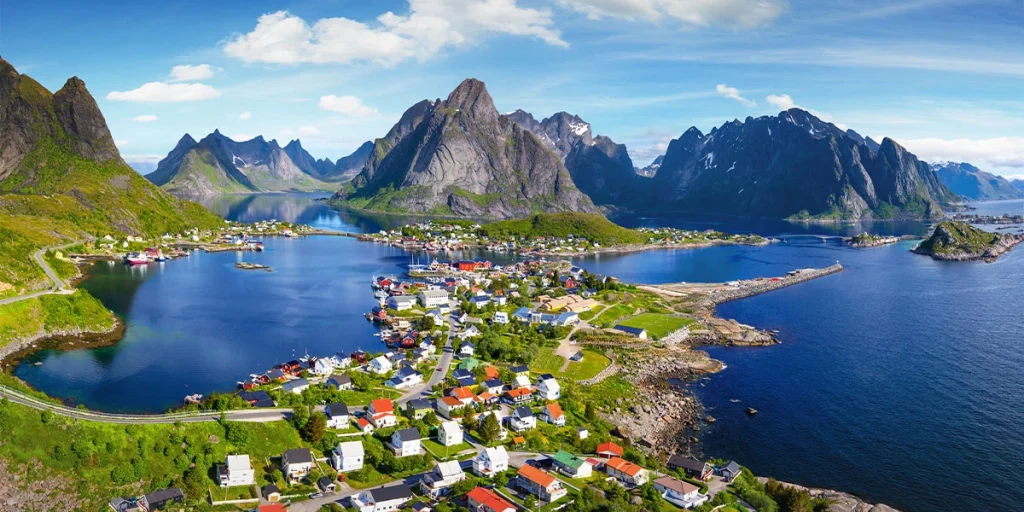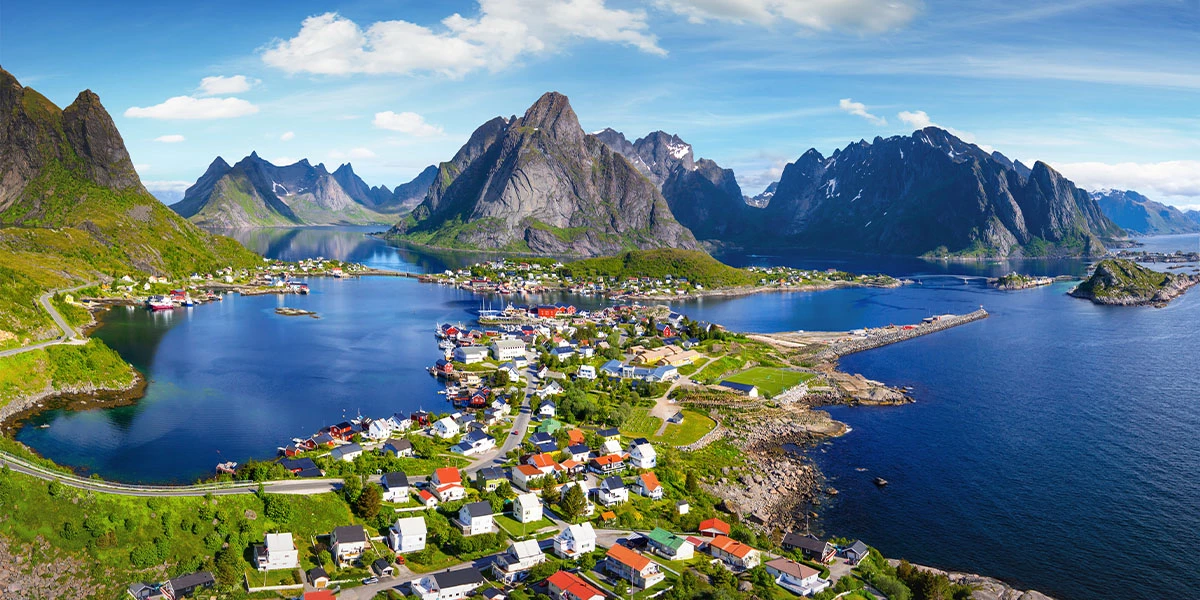Norway, nestled in the northern part of Europe on the Scandinavian Peninsula, is renowned for its natural beauty, high standard of living, rich cultural heritage, and excellent education system. With majestic fjords, northern lights, and a history shaped by the Vikings, Norway is more than just a picturesque destination—it’s a prime location for higher education. In this comprehensive guide, we will delve into everything you need to know about pursuing a master’s degree in Norway, including its advantages, available universities, admission requirements, living costs, and scholarships.
Why Choose Norway for a Master’s Degree?

Norway offers several compelling reasons for international students to pursue their master’s degree here. While the official language is Norwegian, many universities offer English-taught programs, particularly at the postgraduate level, making it an attractive choice for students from all over the world. Let’s explore the key benefits in more detail:

High-Quality Education
Norwegian universities consistently rank among the best in the world, providing a high standard of education with a focus on research, innovation, and student welfare. Some of the country’s leading institutions are recognized in international rankings, such as the QS World University Rankings and the Times Higher Education rankings, placing them among the top 500 globally.
Norwegian higher education institutions emphasize practical, real-world learning experiences, allowing students to work on research projects and practical cases. This focus on experiential learning equips graduates with the skills required to thrive in their careers. In fields like environmental studies, engineering, and information technology, Norway’s educational institutions have a particularly strong reputation.
Language Options and Accessibility
Norwegian is the primary language of instruction; however, many master’s programs are available in English, especially at public universities. This inclusiveness makes Norway an accessible choice for international students who may not be fluent in Norwegian. English is also widely spoken by the general population, making life easier for international students outside the classroom.
The availability of English-taught courses extends across disciplines, ranging from renewable energy systems to marine biology and public health. Such diverse options allow students to find a program suited to their academic interests without facing language barriers.
Tuition-Free Education at Public Universities
One of the most significant draws for students is the affordability of education in Norway. Most public universities do not charge tuition fees for either local or international students. Students only need to pay a small semester fee, which typically ranges from €30 to €60, covering student services and associations. This cost-effective education model makes Norway especially appealing to students who would otherwise find international education financially burdensome.
Even though tuition is free, the cost of living in Norway can be relatively high. However, the affordable education opportunities offered by the country can make the financial equation work in students’ favor.
Enriching Natural Environment and Unique Cultural Experiences
Studying in Norway is also about embracing the lifestyle and culture that come with living in a country renowned for its stunning landscapes and fascinating history. From fjords to the midnight sun and the northern lights, Norway’s natural wonders create an extraordinary backdrop for academic life.
Students also have the chance to immerse themselves in Viking history and the broader Scandinavian culture, which is characterized by values like equality, sustainability, and a deep respect for nature. Many Norwegian cities combine historical charm with modern amenities, making them comfortable and inspiring places to study.
Top Universities in Norway for Master’s Programs
Norway is home to several highly-regarded universities that provide a wide array of master’s programs, many of which are conducted in English. Here is a closer look at some of the leading institutions:
1. University of Oslo
Ranked 102nd globally, the University of Oslo is one of the most prestigious institutions in Norway. It offers a diverse selection of English-taught master’s programs, including:
- Astronomy
- Data Science
- Development, Environment, and Cultural Change
- Renewable Energy Systems
These programs are designed to equip students with both theoretical knowledge and practical skills, making them well-prepared for careers in academia, industry, or government.
2. University of Bergen
The University of Bergen, ranked 199th in the world, is known for its strong emphasis on research. It offers comprehensive master’s programs in disciplines such as:
- Humanities
- Natural Sciences
- Social Sciences
- Geographies of Sustainable Development
- Global Development Theory and Practice
The university’s academic focus on sustainability and development makes it an excellent choice for students interested in global challenges and social change.
3. Norwegian University of Science and Technology (NTNU)
Ranked 399th, NTNU is Norway’s leading institution for technology and engineering. Its programs are well-suited to those who want to specialize in STEM fields. Some popular English-taught programs include:
- Applied Computer Science
- Digital Infrastructure and Cyber Security
- Industrial Design
With a strong connection to Norway’s business community, NTNU ensures that students benefit from partnerships with companies and organizations, gaining valuable practical experience during their studies.
Admission Requirements for a Master’s in Norway
To be accepted into a master’s program in Norway, applicants need to meet several requirements. Typically, these include:
- Bachelor’s Degree: You need to have a recognized undergraduate degree in a relevant field.
- English Proficiency: If your previous education was not in English, you’ll need to demonstrate your language proficiency with scores from tests such as IELTS or TOEFL.
- Documentation: Most universities require the following:
- Certified Transcripts
- Motivation Letter: This letter should explain why you are interested in the chosen program and how it aligns with your future career goals.
- Letters of Recommendation
- Visa and Residency Permits: International students planning to stay in Norway for more than three months must apply for a student residency permit. Those staying longer than six months also need a personal identity number, which is essential for opening a bank account, signing a lease, and other activities.
Cost of Living and Tuition Fees
While public universities in Norway offer free education, living expenses in the country can be considerable. The estimated monthly costs include:
- Rent: A one-bedroom apartment in the city center costs approximately NOK 9,865, while outside the city, it costs around NOK 7,865.
- Other Monthly Expenses: Including food, transport, and leisure, the average cost is roughly NOK 10,910.
Accommodation Options for Students
Universities often assist students in finding accommodation, which is a critical aspect of settling into life in Norway. Examples of university accommodation options include:
- University of Oslo: The SiO Housing service offers students various accommodation choices, including single rooms, double rooms, and family apartments.
- University of Bergen: Sammen Student Housing offers affordable accommodation, typically costing around NOK 4,000 per month, including utilities such as Wi-Fi.
- NTNU: NTNU’s Office of International Relations helps students secure accommodation tailored to their needs.
Scholarships and Financial Aid Opportunities
Norway offers several scholarships to help international students manage the high living costs. Some of the popular options include:
- Erasmus Mundus: This international scholarship program allows students to complete parts of their education in different European countries.
- University Scholarships: Many Norwegian universities offer their own scholarships for international students, which can significantly reduce the financial burden.
Career Prospects After a Master’s Degree in Norway
Completing a master’s degree in Norway offers more than just a quality education. It also provides a stepping stone to excellent career opportunities, both within Norway and internationally. Norwegian universities emphasize skills that are highly valued by employers, such as critical thinking, research abilities, and teamwork.
Moreover, studying in Norway gives you the opportunity to network with local and international professionals, which can be beneficial if you wish to work in Europe after graduation. Graduates can also continue their academic careers by applying for Ph.D. programs across Europe or in Norway.
Conclusion and Key Takeaways
If you are considering studying for a master’s degree in Norway, it is essential to weigh the advantages of high-quality, tuition-free education against the higher cost of living. With free education at public universities, a wide range of English-taught courses, and a commitment to research and innovation, Norway is an excellent destination for ambitious students.
Next Steps for Prospective Students
If you’re ready to take the plunge into Norwegian education, start by researching programs that align with your interests. Prepare your application materials well in advance, as deadlines can vary across institutions. Make sure to also explore housing options early, and don’t hesitate to reach out to university representatives for additional guidance.
For more information, visit the official websites of Norwegian universities or explore international student portals that provide detailed insights into studying in Norway. You can also connect with student communities online to gain first-hand perspectives on life as an international student in Norway.

